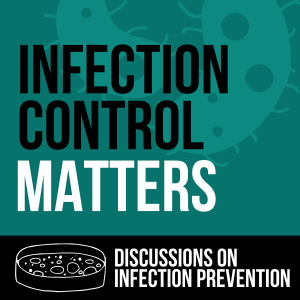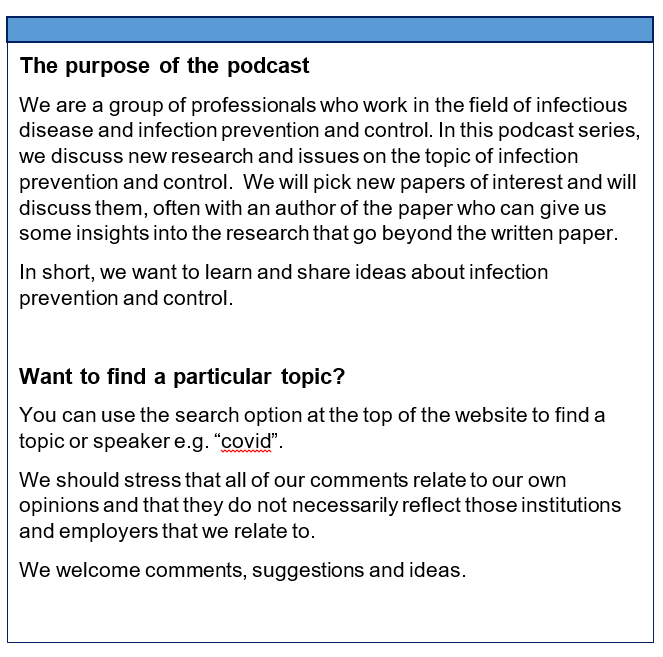Infection Control Matters
We are a group of professionals who work in the field of infectious disease and infection prevention and control. In this podcast series, we discuss new research and issues on the topic of infection prevention and control. We will pick new papers of interest and will discuss them, often with an author of the paper who can give us some insights into the research that go beyond the written paper. Authors will include nurses, doctors, academics, clinicians, administrators and leaders. We should stress that all of our comments relate to our own opinions and that they do not necessarily reflect those institutions and employers that we relate to. We welcome comment, suggestions and ideas. Please consider subscribing for updates and to find collections of topic specific podcasts at www.infectioncontrolmatters.com
Episodes

Wednesday Jul 20, 2022
Wednesday Jul 20, 2022
In this week's episode, Brett and Martin caught up with Jon Otter to discuss the 'Glove or no glove' campaign currently being implemented at Guy's and St Thomas' Hospitals in London UK. Jon has recently blogged about this (https://reflectionsipc.com/2022/05/04/we-need-to-talk-about-gloves/), a blog always worth following if you like to read Jon's thoughts and musings on current issues in IPC.

Wednesday Jul 13, 2022
Wednesday Jul 13, 2022
In this week's episode, Martin Kiernan talks to Brett Mitchell about his recent paper that estimates the burden of HCAI from a prevalence study.
Papers discussed are:
Lydeamore MJ, Mitchell BG, Bucknall T, Cheng AC, Russo PL, Stewardson AJ Burden of five healthcare associated infections in Australia. Antimicrob Resist Infect Control 2022; 11: 69. https://aricjournal.biomedcentral.com/articles/10.1186/s13756-022-01109-8
Russo PL, Stewardson AJ, Cheng AC, Bucknall T, Mitchell BG The prevalence of healthcare associated infections among adult inpatients at nineteen large Australian acute-care public hospitals: a point prevalence survey. Antimicrob Resist Infect Control 2019; 8: 114. https://aricjournal.biomedcentral.com/articles/10.1186/s13756-019-0570-y

Wednesday Jul 06, 2022
Wednesday Jul 06, 2022
This week's podcast is a live chat recorded in Melbourne in June and features Phil Russo, Brett Mitchell and Martin Kiernan, who discuss whether we think that we are IPC experts (or not). Have a listen and make your own mind up!

Wednesday Jun 29, 2022
Wednesday Jun 29, 2022
A/Professor Deb Friedman is the Deputy Chief Health Officer at the Department of Health Victoria, Australia. Prior to that she was the Medical Director of infection prevention control and response in Victoria, a key role in Victorias covid response. With an extensive history in infection prevention and control as an infectious diseases physician Deb has played a vital role in Victoria's COVID response. In this episode, Phil Russo chats to her about her role as DCHO and her recent involvement with the arrival of monkey pox. With her great insight Deb also shares her views about the airborne v droplet paradigm.

Wednesday Jun 22, 2022
Wednesday Jun 22, 2022
In this podcast Phil Russo chats with Dr Sally Roberts, Clinical Head of Microbiology at the Auckland District Health Board, Aotearoa New Zealand. She is also the National Clinical Lead for the Health Quality & Safety Commission New Zealand Infection Prevention and Control programme and recently led the recent first national point prevalent survey of healthcare associated infections across Aotearoa New Zealand. Sally tells us what led to the first ever PPS in Aotearoa New Zealand, the many challenges they endured, the major findings and how the data will be used nationally. A publication is in the making, in the meantime you can read the full Aotearoa New Zealand Health Safety and Quality report here.

Wednesday Jun 15, 2022
Wednesday Jun 15, 2022
In this podcast, Brett talks to Dr Gillian Ray-Barruel from the University of Queensland and Griffith University. We talk about Gillian's development of the I-DECIDED tool - decision tool for assessment and management of all invasive devices in the hospital setting.
In the podcast, Gillian mentioned she was happy to be contacted.
The link to the paper can be found here: https://pubmed.ncbi.nlm.nih.gov/35439078/

Wednesday Jun 08, 2022
Wednesday Jun 08, 2022
In this podcast, Martin and Brett talk to Trish Hurst, Belinda Henderson and Dr Patrick Harris about how WGS is being used in two major Australian hospitals. We here about how it started, how is works now and the potential of WGS in real-time for infection control services.
The discussion is centred around this pre-print publication: https://www.medrxiv.org/content/10.1101/2022.05.02.22273921v1 "Clinical implementation of routine whole-genome sequencing for hospital infection control of multi-drug resistant pathogens"

Wednesday Jun 01, 2022
Wednesday Jun 01, 2022
In this week's episode, Martin Kiernan talks to Dr David Weber, Professor of Medicine, Pediatrics and Epidemiology at the University of North Carolina about recent papers on environmental contamination with Clostridioides difficile. We discuss antibiotics and the effect of asymptomatic carriage on risk of transmission. The papers we discuss are:
Warren BG, et al. The Impact of Infection Versus Colonization on Clostridioides difficile Environmental Contamination in Hospitalized Patients With Diarrhea. Open Forum Infect Dis. 2022;9(4):ofac069. https://doi:10.1093/ofid/ofac069
Turner NA, et al. Impact of Oral Metronidazole, Vancomycin, and Fidaxomicin on Host Shedding and Environmental Contamination With Clostridioides difficile. Clin Infect Dis. 2022;74(4):648-656. https://doi:10.1093/cid/ciab473

Wednesday May 25, 2022
Wednesday May 25, 2022
In this podcast, Brett Mitchell talks to Professor Daryl Williams about respirators and facial hair. So much to learn, so much more to know. The talk was based on a paper published in Infection Disease and Health.
The article link: https://www.idhjournal.com.au/article/S2468-0451(22)00003-7/fulltext
Prof Daryl Williams is the Director of the Department of Anaesthesia and Pain Management. His clinical and research interests include neuro-anaesthesia, resuscitation, trauma medicine and advanced airway management.

Wednesday May 18, 2022
Wednesday May 18, 2022
After his excellent session atthe ECCMID meeting, Martin talks to Dr Gonzalo Bearman (Chief of Infectious Diseases at VCU Health, Editor in Chief of Antimicrobial Stewardship Healthcare Epidemiology (ASHE), footballer and drummer) about the removal of contact precautions for endemic organisms like MRSA and VRE and how evidence can change practice. Challenges of applying evidence from one setting to another are also discussed. Some of Gonzalo's papers on this subject are here:
Bearman GM, et al. A controlled trial of universal gloving versus contact precautions for preventing the transmission of multidrug-resistant organisms. Am J Infect Control. 2007;35(10):650-655. https://10.1016/j.ajic.2007.02.011
McLemore A, et al. Effect of contact precautions on wait time from emergency room disposition to inpatient admission. Infect Control Hosp Epidemiol. 2011;32(3):298-299. https://doi:10.1086/658913
Banach DB, et al. Duration of Contact Precautions for Acute-Care Settings. Infect Control Hosp Epidemiol. 2018:1-18. https://doi:10.1017/ice.2017.245
Bearman G, et al. Impact of Discontinuing Contact Precautions for Methicillin-Resistant Staphylococcus aureus and Vancomycin-Resistant Enterococcus: An Interrupted Time Series Analysis. Infect Control Hosp Epidemiol. 2018;39(6):676-682. https://doi:10.1017/ice.2018.57
Godbout EJ, et al. Impact of discontinuation of contact precautions on central-line associated bloodstream infections in an academic children's hospital. Infect Control Hosp Epidemiol. 2019:1-3.
Haessler S, et al. Stopping the routine use of contact precautions for management of MRSA and VRE at three academic medical centers: An interrupted time series analysis. Am J Infect Control. 2020;48(12):1466-1473. https://doi:10.1016/j.ajic.2020.06.219
Morgan DJ, et al. Contact Precautions for Endemic MRSA and VRE: Time to Retire Legal Mandates. JAMA. 2017;318(4):329-330. https://doi:10.1001/jama.2017.7419
Bearman G, et al. Control of drug-resistant pathogens in endemic settings: contact precautions, controversies, and a proposal for a less restrictive alternative. Curr Infect Dis Rep. 2012;14(6):620-626. https://doi:10.1007/s11908-012-0299-8

About us and contact
Feel free to contact us with suggestions on topics and or speakers. Use Twitter to contact any one or all of us:
Brett Mitchell @1healthau (Twitter link)
Martin Keirnan @emrsa15 (Twitter link)
Deb Friedman @friedmanndeb
Phil Russo: @PLR_aus (Twitter link)

Martin Kiernan: Martin is a highly experienced nurse who has worked in the field of infection prevention and control since 1990 in the acute hospital community and, more recently, in academic and industry settings with GAMA Healthcare. Martin's reputation as a research collaborator is recognised both nationally and internationally. Martin’s involvement in professional organisations such as the Infection Prevention Society and the Healthcare Infection Society has enhanced his reputation as a key opinion leader, teacher, leader, and researcher. As a result, he has been invited to act in leadership and mentoring roles to support his colleagues throughout the world in terms of infection prevention.

Professor Brett Mitchell: Brett is a Professor of Nursing with over 150 peer reviewed journal and oral conference presentations, authored several books, and has been an invited speaker at numerous infection prevention and control conferences in Australia and internationally. He is a Fellow of the Australasian College for Infection Prevention and Control and the Australian College of Nursing. Professor Mitchell is also Editor-in-Chief of Infection, Disease and Health. Professor Mitchell has experience leading nursing teams, research teams and infection prevention and control teams in both Australia and the United Kingdom. Further details: https://www.newcastle.edu.au/profile/brett-mitchell

Associate Professor Philip Russo: Phil is Director of Research, Nursing and Midwifery, Faculty of Medicine, Nursing and Health Sciences, Monash University, Victoria, Australia and Director of Nursing Research, Cabrini Health. A/Prof. Russo is the Past President of the Australasian College for Infection Prevention and Control. He has worked in both state and national positions, notably leading the establishment of the VICNISS Surveillance Program in Victoria followed by overseeing the successful implementation of the National Hand Hygiene Initiative sponsored by the Australian Commission for Safety and Quality in Health Care. Recently he has been an advisor at both a State and National level in the pandemic response. Further details: https://research.monash.edu/en/persons/philip-russo







